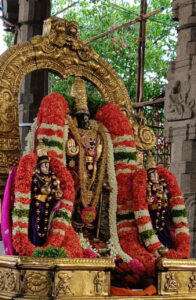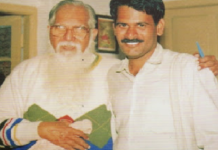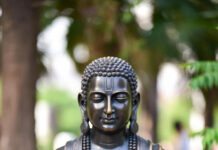
Dear J,
My respects to you. Hope you are doing well. Congratulations on your sixtieth birthday & anniversary celebrations (Mani vizha).
I read your essay “Confronting Hatred towards Hinduism”. I am writing this email to pose a question about Hindutva politics which that essay talked about.
How can ordinary Hindus respond to the hatred towards Hinduism that has been politicized both at home and abroad as you have mentioned?
For example, people of other religions (including Hindus of certain castes) remain united in a political stance at the state or national level while exercising their vote. The parties that they support, thrive by insulting and belittling Hinduism and Brahmins for their politics. But Muslims and Christians ignore it (or stay aloof) as a dispute between Hindus.
While the situation remains thus, if any party were to respect and provide a voice for Hinduism and the cultural tradition that has been operating here for ages (or atleast claim to be one), won’t the common Hindu end up supporting it? Especially given the stark contrast to parties that operate under the premise that the entirety of Hinduism and Bharatiya culture is backward in nature and use other religions merely for identity politics with fake secularism.
Such a supporter is portrayed as an enemy of other religions and of secularism. Within our system of representative democracy, what other option does a common Hindu have?
Looking forward to your views on this.
With regards,
Venkat.
*
Dear Venkat,
There’s a tendency among teenagers. If their parents scold them “You will end up a nobody if you continue this way”, they will get angry and strive to be a nobody simply to spite their parents. What you have stated is not very different. Why do we need intellect and thinking to reach conclusions that can be arrived at without much effort? But if one were to seek the truth and the ways of the future, we need true intellect and thought.
There are people who say “Look at that religion. How can they behave like that? The only way to respond to them is to behave exactly like they do!”. Such people will not be able to understand the following question at all: “You belong to this religion because of your belief that this religion is unique, right? If your religion were to forego its uniqueness and become similar to other religions, why should you remain in this one? Couldn’t you just as easily be a part of any other religion?”.
There are four qualities that form the basis of Hindu religion. These have evolved through the ages, conceived by several Hindu philosophers, and have been collated as Hindu philosophical texts.
- Hindu religion’s heterogeneity and internal expansion: The Hindu religion accommodates a range of beliefs, religious practices and philosophies within it. It absorbs new ones continuously and constantly creates space for sub groups within itself.
- Individual Freedom: The Hindu religion views salvation solely as an individual pursuit. Even the path towards salvation is the individual’s choice. Hence no Hindu is bound to any organized center of authority here.
- The Hindu religion has a perspective of viewing foundational core tenets and practical principles separately. There are no sacred texts that are final. Hindu sages gave us only the core philosophical visions (darshanas). The ‘do’s and don’ts’ of daily life are not considered to be of philosophical merit. Hindu philosophy permits them to change with time (and it has indeed been changing over time). The Hindu tradition of wisdom is not constituted by immutable ideologies. It consists only of philosophical visions that have been taught and learnt over the ages. It accords higher importance to universal truths over concepts of morality and ritual sanctity.
- There exists a concept of an endless lineage of Sages and of a lineage of Gurus. Hence there is no ‘final’ sage or a Guru who has the last word. The lineage is always progressing. These sages and Gurus are the ones with ‘authority’ in the Hindu religion, not kings or the state. These sages have clarity that ‘I am not a citizen of any state’ (‘நாமார்க்கும் குடி அல்லோம்’) (one who doesn’t have this clarity is not a sage, merely the head of an organization).
The Hindu religion is unique only because of these characteristics. It offers opportunities for salvation that no other religion affords. This is the reason why I am a Hindu, and why I believe this Hindu tradition of wisdom should not be destroyed and that it should continue.
Let’s consider if someone tells me, “The Hindu tradition of wisdom will perish, and the only way to save it is to abandon the four qualities mentioned above.” This would be my answer: “If it were not for those qualities, it is not the Hindu religion that I believe in at all. Why should I strive to keep such a thing alive? What is the use of perpetuating it merely as a gang identity, a few symbols and a few organizations?”
I state that Hindu traditions should stay away from politics simply because the four foundational values of Hindu religion will inevitably be destroyed by those who are striving to politicize it.
My understanding of why it is so is from my experience. It is evident from observing the internet too.
- Homogenization: When a political entity makes use of the Hindu identity, it refutes the quality of Hindu traditions to expand and grow both internally and externally and converts Hindus into a homogenous group of believers. It cannot achieve political power without doing this. This savage homogenization is against the basic nature of Hinduism.
- Organization: As a result of homogenization, religious organizations will ascend to power and control Hindu traditions. They would achieve political dominance. As a result, independent spiritual seekers will be repressed. Even today, several religious organizations in North India have reached a state where Vedantic thoughts cannot be placed in public without persecution. This happens inevitably in all places where religion associates itself with authority.
If a Sage (Siddhar) were to say ‘What is inside the temple is not a God, but merely a stone’, he would be beaten up today in North India. But the light of Hindu wisdom has been carried forward throughout history by sages like these. How would a person like Nitya Chaitanya Yati, who never worshiped in any temple, be treated in an environment ruled over by these organizations? How can a spiritual aspirant accept an environment that doesn’t permit Nitya a place?
Refuting Debate: Hindu sub groups evolve through unconstrained internal debate. Everyone has the right to refute and reinterpret Hindu philosophy and symbols. That freedom is the fundamental mechanism underlying Hindu philosophy. When religious concepts and ideologies become political identities, they suddenly become sacred and irrefutable. Those who criticize and refute it become enemies. Politicians and the mobs they mobilize will rise up to oppose and suppress them. This has happened everywhere in the world where religion was politicized. It is possible here too.
For example, if a Vedantin were to say “The Rama in our scriptures is merely a metaphor, a king only, a man with all his blemishes and not a God”, those who politicize Rama will rise up and try to suppress him. They would have made Rama an religious and ethnic identity that is beyond commentary. Any identity can gain political power only through this step.
In Kerala, the birthplace of Vedanta and the birthplace of Adi Shankara, when a great Vedantin named Kumaran Aasaan described Rama thus in a poem and a Professor, MM Basheer wrote an article in Mathrubhoomi newspaper about it, he received threats that his hands would be cut off and the article had to be withdrawn. The professor who wrote the article belongs to the Sufi tradition, an approach very close to Vedanta. He has written commentaries to several Vedantic texts. (Bashir and Ramayana)
This kind of repressive politics is completely against Hindu tradition. If Vedanta cannot have a voice in the land of Shankara and if it requires the approval stamp of politicians and their gangs, is this the tradition bequeathed to us by our forefathers? Is this the country of eternal wisdom that we aspire to be?
Conversion into an instrument of Power: The politics of religion accords no regard to true religion beyond the fact that it serves as its instrument. It has no regard for spirituality. It will not hesitate to insult, suppress and destroy any Hindu sage, if he were to speak against its politics. Since I spoke against Hindu politics and because Nitya Chaithanya Yati had condemned it, vile obscenities were published by Hindutvites who revel in public hatred about Nitya Chaithanya Yati and Nataraja Guru. Those sages were subject to unprintable obscenities; it is there on the internet for everyone to see.
One could argue that those behind it were mentally disturbed. But has any one traditionalist or orthodox religious person who supports them uttered a single censure against these overzealous Hindutvites? Will they dissociate themselves from the obscene criticisms? No, they cannot. Politics is essentially an activity conducted by a group of people. Nobody can violate the ground rules of a group. If Hindu sages themselves are going to be vilified by Hindutva politics, what benefit can such politics afford to Hindu traditions of wisdom?
Religious Authority: A tradition of wisdom can advance only through continual self-criticism and over-stepping existing boundaries. This is the domain of sages and scholars. Between them there exists space for all kinds of debates and transgressions. When a political movement claims to speak for religion, they will first attempt to gag the sages and scholars. Politicians are concerned with political gain exclusively. Their speeches, their actions are all aimed towards the capture of political power and in its successful retention. The wisdom sought by religion is not their objective in the least. Politics has no purpose or objective that is universal in nature, beyond the everyday.
Therefore a religion being taken up with a political objective, simply means the demise of that religion. The ideologies and activities of any political movement, undertaken for the sake of its political objectives, cannot be laid at the door of a religion or its philosophy. Religion should refuse to be caught in the trappings of the hatred, bitterness and polarization that are created by politics. Religion should not allow itself to be charged for the activities of politics. Because if one has reaped the benefit of religion within politics, one cannot claim that religion is not responsible for things that went wrong in politics.
Polarization: Religion and the philosophy which resides in its core, can only exist when devoid of ‘enemies’. It can only exist transcending conflict. Malice, bitterness and polarization have absolutely no place in philosophy. Even if there is a little bit of bitterness, a tinge of fear or a mild resentment towards something, one cannot walk the path of philosophy. If you doubt this, ask anyone who runs a truly good yoga studio. Politics is next to useful there. But there can be no politics without ‘the other’ and ‘the foreign’.
See the politicians for yourself. Please see the heights of resentment, hatred and polarization that they live their lives. They torture themselves daily with fear, doubt and anger, thinking constantly about their enemies. Does this sound like something that spirituality provides? Can such a person ever be a guardian of spirituality?
**
Let’s examine this. Can a political movement really save religion, as you and a few other gullible people seem to believe? Can a government or state make a religion or philosophy thrive?
If you think the answer is yes, what exactly is your conception of a religion? Isn’t it just another center of authority or a societal group? If you consider religion to be a collation of philosophical tenets, won’t philosophers be the only ones who can make it thrive? And safeguard it?
What have the governments propounding Hindutva really done to the Hindu tradition till now, apart from appropriating identities? Which other government has done any good to any other tradition ever?
That Hindu philosophy is under attack, distorted and pushed towards annihilation by a vast coalition of international forces is true. These are the same forces of extermination that have killed and continue to kill the endangered natural religions of the world. Only time will tell whether Hindu traditions of wisdom will survive this onslaught.
But the way to survive and thrive is not to make a political party out of it. Nor is it to seek refuge in politics. These steps will only hasten the process of destruction. It is politicians who unfailingly perform all the activities that attackers of Hindu traditions (and those who generate antipathy against Hindu traditions at an international level) level as accusations and thereby attract further attacks. Those who claim to be supporters of Hindu religion and resort to abhorrent language, propounding hate and bitterness are besmirching Hindu traditions.
As I have stated already, the Hindu tradition, being an ancient natural religion, by virtue of the very same antiquity, might contain tribal customs and beliefs or practices of an anachronistic nature. The Hindu tradition is under attack by simply portraying them alone as the entirety of Hindu religion. In such a situation, those who care about Hindu religion would only focus on removing those defective aspects. They won’t become an apologist or take up cudgels in defense of it. It is important to retain the core and continue weeding out the chaff.
A high decibel vilification propaganda is underway that ‘Hindu traditions are constituted entirely of backward customs and rituals’. In this situation, the only thing that we can do to protect and grow the Hindu tradition is to place in front of the world the philosophy of the Hindu tradition, its theories, its arts and literature, its enormous expanse of symbolism, its collection of primal archetypes and above all, its magnificent nature of assimilation. Our future generations should do so too.
Before that can happen, we should learn them ourselves. We should have clarity first, equip ourselves with the certainty that comes only with knowledge. To learn, we should be familiar with our books and sages. Please consider this, if there were a million persons in Tamilnadu today (i.e. 2% of the total Hindu population) with the knowledge and clarity about Hindu religion and Hindu philosophy, there would be no anti-Hindu propaganda that we need to fear about. Isn’t it true that such propaganda gains currency only because none amongst us reads, learns and understands anything?
We do not know a thing about our tradition. Nor do we have the inclination to learn. Our excuse is that we don’t have the time. What we do know about Hindu religion is from the words of those who attack the Hindu religion. There can be no bigger madness than the fervent belief that we will be able to save the Hindu religion by simply voting for a political party.
Politics is merely us giving a few people the authority to decide how our tax money is to be spent. That wealth ought to be spent on growing the economy and the maintenance of law and order here. The question that needs to be asked in politics is whether the people whom we vote for are capable of the above. Not whether they are of the same religion as us or whether they will save our religion. Our religion will be saved by sages and scholars. Let’s identify them and extend our support to them.
My politics is simply this: Maintaining the prodigious unity of this country is absolutely essential even for India’s economic growth. That unity can only emerge from an inclusive approach.
Jeyamohan
Translated By Gokul












